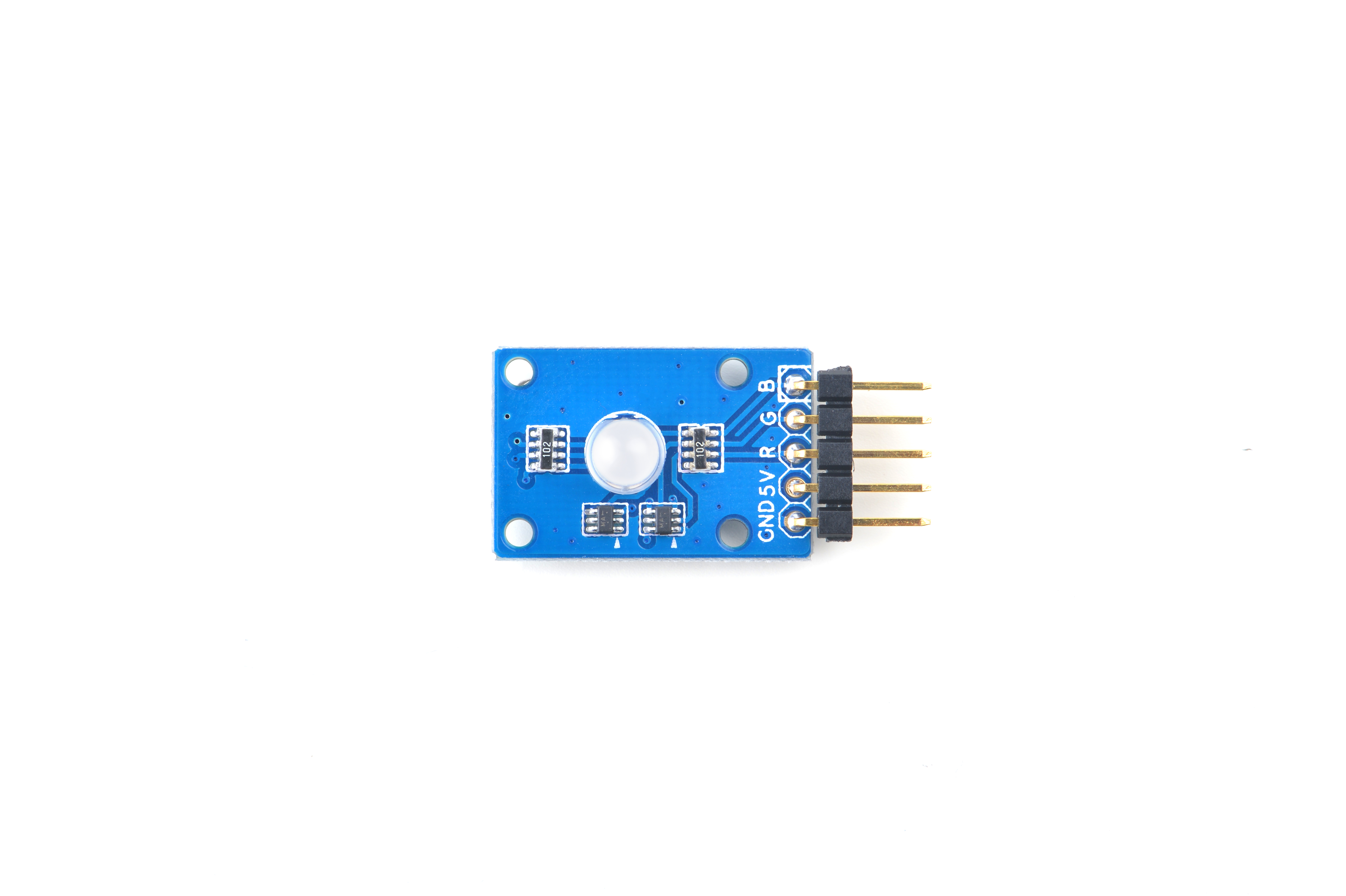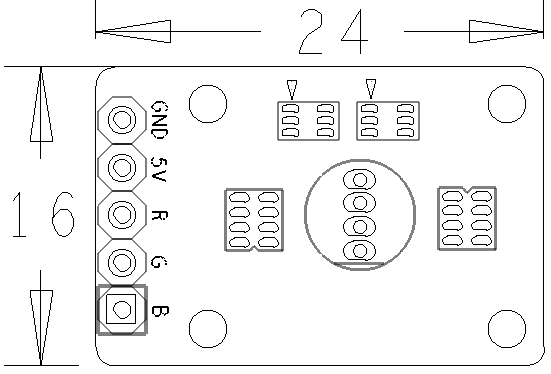Difference between revisions of "Matrix - RGB LED"
(→Introduction) |
(→Introduction) |
||
| Line 4: | Line 4: | ||
[[File:Matrix-RGB_LED.png|thumb|]] | [[File:Matrix-RGB_LED.png|thumb|]] | ||
* The Matrix-RGB_LED is a RGB LED module. It has a 2.54mm pitch pin-header in which 5V is power supply, GND is ground, and R,G,B are connected to the LED’s red, green and blue pins. | * The Matrix-RGB_LED is a RGB LED module. It has a 2.54mm pitch pin-header in which 5V is power supply, GND is ground, and R,G,B are connected to the LED’s red, green and blue pins. | ||
| − | * The inputs to Pin R, G and B can be either GPIO signals or PWM signals. The signal level can be either 3.3V or 5V. | + | * The inputs to Pin R, G and B can be either GPIO signals or PWM signals. The signal level can be either 3.3V or 5V. When the inputs to Pin R,G and B are high the LED will be the brightest.When the inputs to Pin R,G and B are low the LED will be completely off. When the inputs are PWM signals the LED's brightness can be controlled by controlling the PWM's duty cycle. |
| − | + | ||
==Features== | ==Features== | ||
Revision as of 15:43, 23 June 2016
Contents
1 Introduction
- The Matrix-RGB_LED is a RGB LED module. It has a 2.54mm pitch pin-header in which 5V is power supply, GND is ground, and R,G,B are connected to the LED’s red, green and blue pins.
- The inputs to Pin R, G and B can be either GPIO signals or PWM signals. The signal level can be either 3.3V or 5V. When the inputs to Pin R,G and B are high the LED will be the brightest.When the inputs to Pin R,G and B are low the LED will be completely off. When the inputs are PWM signals the LED's brightness can be controlled by controlling the PWM's duty cycle.
2 Features
- GPIO or PWM input, 3.3/5V, LED lightness controllable via PWM
- Small
- 2.54 mm pitch pin-header
- PCB dimension(mm): 16 x 24
- Pin Description:
| Pin | Description |
| GND | Ground |
| 5V | Supply Voltage 5V |
| R | Red |
| G | Green |
| B | Blue |
3 工作原理
- RGB_LED的内部封装了三颗不同颜色的灯珠,三个灯珠的阳极或者阴极并联,当给另外三个引脚施加控制信号时,对应的LED就会亮起。当两种或三种LED亮起时,根据三原色原理,会组成其他颜色的光。施加PWM信号时,不同占空比的PWM信号可以调节R、G、B颜色光发光的亮度,从而组合成多种颜色。
4 Applications
4.1 Connect to NanoPi M1
Refer to the following connection diagram to connect the module to the NanoPi M1:
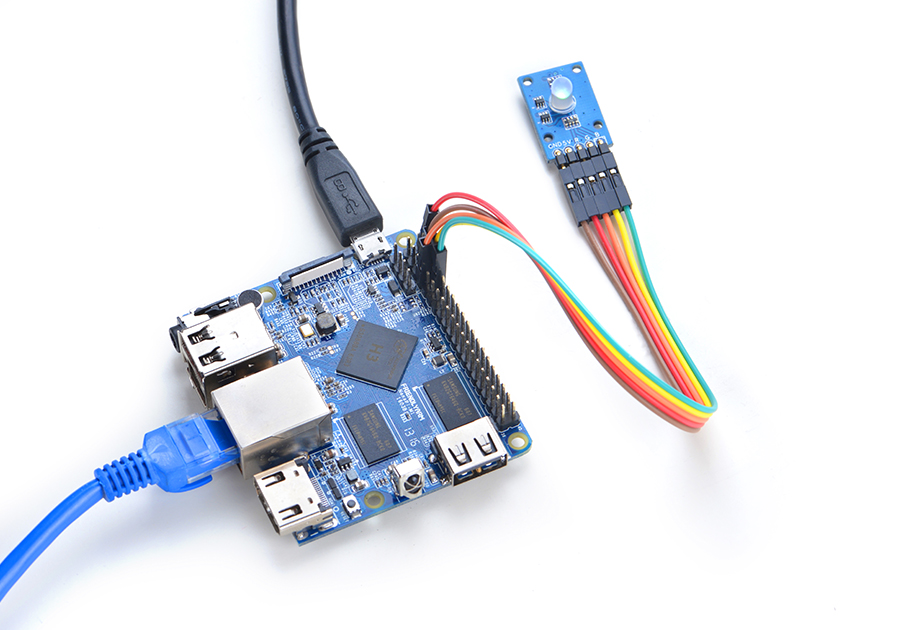
Connection Details:
| Matrix-RGBLED | NanoPi M1 |
| R | Pin7 |
| G | Pin8 |
| B | Pin10 |
| V | Pin4 |
| G | Pin6 |
4.2 Connect to NanoPi 2
Refer to the following connection diagram to connect the module to the NanoPi 2:
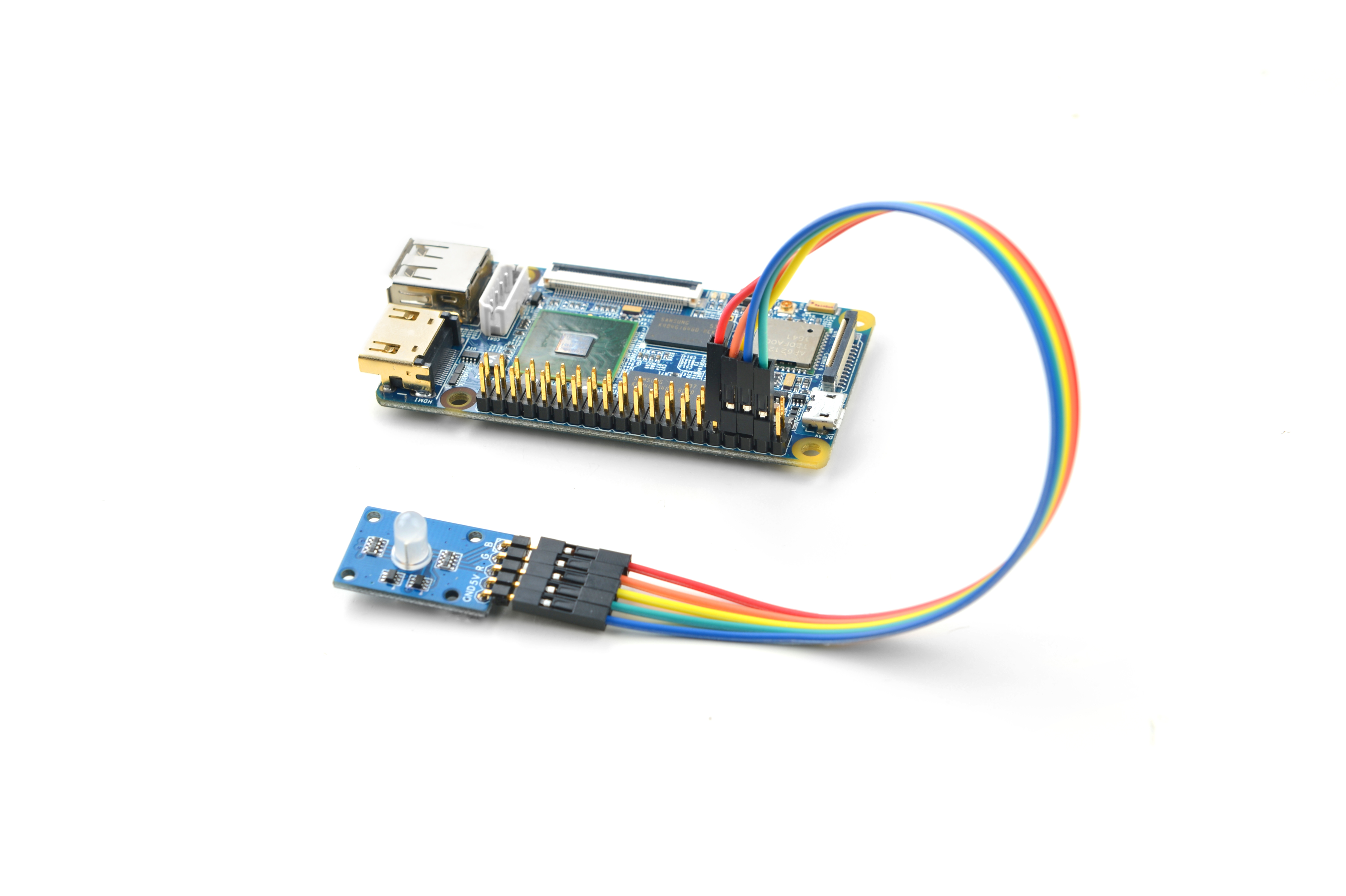
Connection Details:
| Matrix-RGBLED | NanoPi 2 |
| R | Pin7 |
| G | Pin8 |
| B | Pin10 |
| V | Pin4 |
| G | Pin6 |
4.3 Connect to NanoPi M2 / NanoPi 2 Fire
Refer to the following connection diagram to connect the module to the NanoPi M2/ NanoPi 2 Fire.
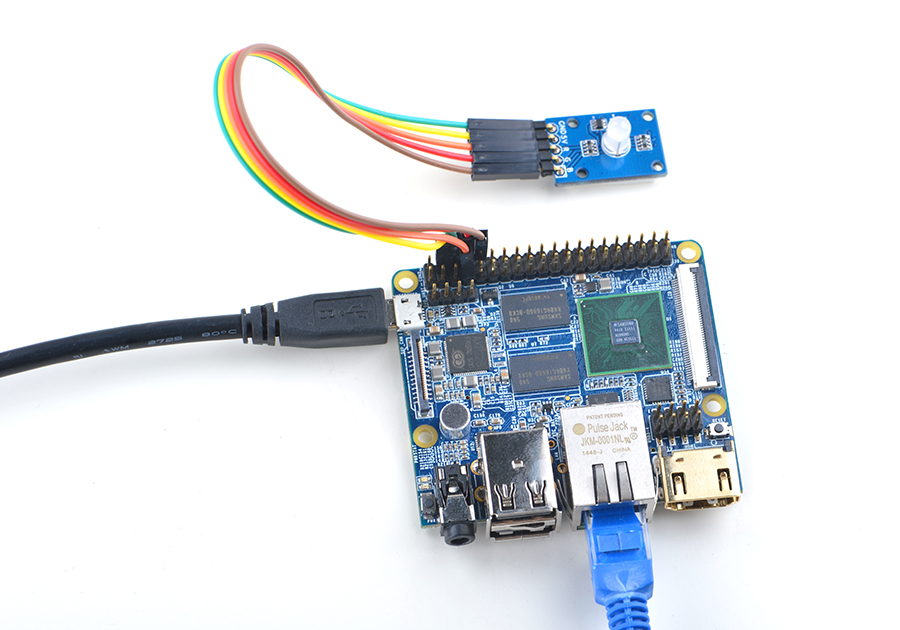
Connection Details:
| Matrix-RGBLED | NanoPi M2 |
| R | Pin7 |
| G | Pin8 |
| B | Pin10 |
| V | Pin4 |
| G | Pin6 |
4.4 Connect to NanoPC-T2
Refer to the following connection diagram to connect the module to the NanoPC-T2:
Matrix-RGBLED_NanoPC-T2
Connection Details:
| Matrix-RGBLED | NanoPC-T2 |
| R | Pin15 |
| G | Pin16 |
| B | Pin17 |
| V | Pin29 |
| G | Pin30 |
5 Compile & Run Test Program
Boot your ARM board with Debian and copy the matrix code:
$ apt-get update && apt-get install git $ git clone https://github.com/friendlyarm/matrix.git
If your cloning is done successfully a "matrix" directory will be generated.
Compile and install Matrix:
$ cd matrix $ make && make install
Run test program:
$ matrix-rgb_ledNote: this module is not plug and play therefore before running the module please make sure it is connected to an ARM board.
Here is what you should observe:
Set RGB LED: 0 Set RGB LED: 1 Set RGB LED: 2 Set RGB LED: 3 Set RGB LED: 4 Set RGB LED: 5 Set RGB LED: 6 Set RGB LED: 7
You will see the LED displaying different colors.
6 Code Sample
This Matrix code sample can work with all the ARM boards mentioned in this module's wiki. The name of this code sample is "matrix-rgb_led". Here is its source code:
int main(int argc, char ** argv) { int ret = -1; int val, board; if ((board = boardInit()) < 0) { printf("Fail to init board\n"); return -1; } if (board == BOARD_NANOPI_T2) { ledPin1 = GPIO_PIN(15); ledPin2 = GPIO_PIN(16); ledPin3 = GPIO_PIN(17); } if ((ret = exportGPIOPin(ledPin1)) == -1) { printf("exportGPIOPin(%d) failed\n", ledPin1); } if ((ret = setGPIODirection(ledPin1, GPIO_OUT)) == -1) { printf("setGPIODirection(%d) failed\n", ledPin1); } if ((ret = exportGPIOPin(ledPin2)) == -1) { printf("exportGPIOPin(%d) failed\n", ledPin2); } if ((ret = setGPIODirection(ledPin2, GPIO_OUT)) == -1) { printf("setGPIODirection(%d) failed\n", ledPin2); } if ((ret = exportGPIOPin(ledPin3)) == -1) { printf("exportGPIOPin(%d) failed\n", ledPin3); } if ((ret = setGPIODirection(ledPin3, GPIO_OUT)) == -1) { printf("setGPIODirection(%d) failed\n", ledPin3); } signal(SIGINT, intHandler); for (val = 0; val < 8; val++) { printf("Set RGB LED: %x\n", val); setRGBLED(val); usleep(1000 * 1000); } unexportGPIOPin(ledPin1); unexportGPIOPin(ledPin2); unexportGPIOPin(ledPin3); return 0; }
For more details about this APIs called in this code sample refer to Matrix API reference manual
